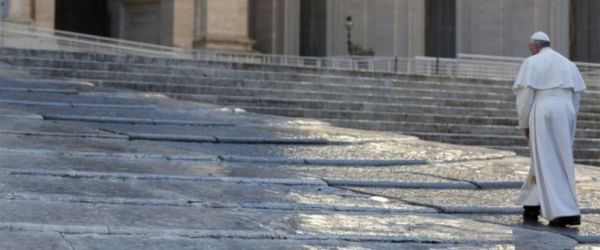The "ghost of hypocrisy" makes us forget how to caress a sick person, a child or an elderly person. And it does not make us look into the eyes of the person to whom we hastily give alms, immediately withdrawing our hand so as not to soil ourselves. It is a warning to "never be ashamed" of "our brother's flesh" that Pope Francis addressed during the mass celebrated on the morning of 7 March in the chapel of the Casa Santa Marta.
On the Friday after Ash Wednesday, the Church, the Pontiff explained, proposes a meditation on the true meaning of fasting. And it does so through two incisive readings, taken from the book of the prophet Isaiah (58:1-9a) and the Gospel of Matthew (9:14-15). "Behind today's readings," said the Pontiff, "there is the ghost of hypocrisy, of formality in fulfilling the commandments, in this case fasting". So "Jesus returns to the theme of hypocrisy many times when he sees that the doctors of the law think they are perfect: they fulfil everything in the commandments as if it were a formality".
And here, the Pope warned, there is "a problem of memory", which concerns "this double face in going on the road of life". The hypocrites in fact 'have forgotten that they were elected by God in a people, not by themselves. They have forgotten the history of their people, that history of salvation, of election, of covenant, of promise' that comes directly from the Lord.
And in so doing, he continued, 'they have reduced this history to an ethic. Religious life for them was an ethic'. Thus "it is explained that at the time of Jesus, theologians say, there were three hundred commandments more or less" to be observed. But 'receiving from the Lord the love of a father, receiving from the Lord the identity of a people and then turning it into an ethic' means 'rejecting that gift of love'. After all, he pointed out, hypocrites 'are good people, they do whatever has to be done, they look good'. But "they are ethicists, ethicists without goodness, because they have lost their sense of belonging to a people".
"Salvation," the Pontiff explained, "the Lord gives it within a people, in belonging to a people". And "this is how one understands how the prophet Isaiah speaks to us today about fasting, about penance: what is the fast that the Lord wants? The fast that has a relationship with the people, the people to which we belong: our people, in which we are called, in which we are inserted".
Pope Francis reread, in particular, this passage from the book of Isaiah: "Is not this rather the fasting that I want: to loosen iniquitous chains, to remove the bonds of the yoke, to set at liberty those who are oppressed, to break every yoke? Is it not to divide bread with the hungry, to bring in the wretched, the homeless, to clothe one whom you see naked, and not to neglect your kinsmen?"
Here, then, is the meaning of true "fasting that," reiterated the Bishop of Rome, "is concerned with the life of one's brother, that is not ashamed of the flesh of one's brother, as Isaiah himself says". In fact, 'our perfection, our holiness goes on with our people, in whom we are elected and inserted'. And 'our greatest act of holiness is precisely in the flesh of our brother and in the flesh of Jesus Christ'.
Thus, he emphasised, even 'today's act of holiness - we here at the altar - is not hypocritical fasting. It is not being ashamed of the flesh of Christ that comes here today: it is the mystery of the body and blood of Christ. It is going to share bread with the hungry, to care for the sick, the elderly, those who cannot give us anything in return: that is not being ashamed of the flesh".
"God's salvation," the Pontiff reiterated, "is in a people. A people that goes forward, a people of brothers who are not ashamed of one another'. But this, he warned, 'is the most difficult fast: the fast of goodness. Goodness leads us to this'. And 'perhaps,' he explained, quoting the Gospel, 'the priest who passed by that wounded man thought' referring to the commandments of the time: 'But if I touch that blood, that wounded flesh, I remain unclean and cannot keep the Sabbath! And he was ashamed of that man's flesh. This is hypocrisy!" Instead, the Holy Father noted, 'that sinner passed by and saw him: he saw the flesh of his brother, the flesh of a man of his people, a son of God like himself. And he was not ashamed'.
"The proposal of the Church today" therefore suggests a real examination of conscience through a series of questions that the Pope posed to those present: "Am I ashamed of the flesh of my brother, of my sister? When I give alms, do I drop the coin without touching the hand? And if by chance I touch it, do I do so immediately?" he asked, mimicking the gesture of someone wiping his hand. And again: 'When I give alms, do I look into the eyes of my brother, my sister? When I know that someone is ill, do I go to see them? Do I greet them with tenderness?"
To complete this examination of conscience, the Pope pointed out, "there is a sign that will perhaps help us". It is "a question: do I know how to caress the sick, the elderly, the children? Or have I lost the sense of caressing?" The hypocrites, he continued, no longer know how to caress, they have forgotten how. Here then is the recommendation to 'not be ashamed of our brother's flesh: it is our flesh'. And "we will be judged", the Pontiff concluded, precisely on our behaviour towards "this brother, this sister" and certainly not "on hypocritical fasting".
[Pope Francis, St. Martha, in L'Osservatore Romano 08/03/2014]


